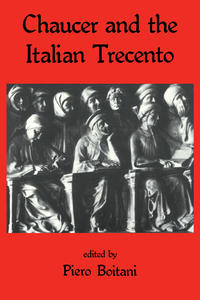Chaucer and the Italian Trecento
CODICE: ISBN 0521313503 EAN 9780521313506
AUTORE/CURATORE/ARTISTA :
Edited by: Piero Boitani Contributors: John Larner, Janet Coleman, Wendy Childs, J. A. W. Bennett, Piero Boitani, David Wallace, Barry Windeatt, Robin Kirkpatrick, Nicholas Havely, Peter Godman, Enrico Giaccherini
EDITORE/PRODUTTORE : Cambridge University Press
COLLANA/SERIE :
DISPONIBILITA': Disponibile
TITOLO/DENOMINAZIONE:
Chaucer and the Italian Trecento
PREZZO : EUR 32,00€
CODICE :
ISBN 0521313503
EAN 9780521313506
AUTORE/CURATORE/ARTISTA :
Edited by: Piero Boitani Contributors: John Larner, Janet Coleman, Wendy Childs, J. A. W. Bennett, Piero Boitani, David Wallace, Barry Windeatt, Robin Kirkpatrick, Nicholas Havely, Peter Godman, Enrico Giaccherini
EDITORE/PRODUTTORE:
Cambridge University Press
ANNO:
1985
DISPONIBILITA':
Disponibile
CARATTERISTICHE TECNICHE:
314 pages
Paperback
cm 15,2 x 22,9
gr 480
DESCRIZIONE:
Publisher's description:
This paperback consists of a collection of essays which have aroused considerable interest, since their first publication in 1983, in a question that has been occupying scholars for many years: what did fourteenth-century Italy and its literature mean to Chaucer? In the first part of the book contributors assess the general state of English and Italian culture in the fourteenth century and the complex network of Anglo-Italian relationships in the areas of trade, finance, church organisation and academic exchange. The second part faces the literary problem that Chaucer's borrowing from Italian authors poses: not only what he takes, but how and why. These essays include source studies and comparative analyses of such masterpieces as The Divine Comedy, The Canzoniere, The Decameron and The Canterbury Tales.
Table of Contents:
Introduction
1. Chaucer's Italy John Larner
2. English culture in the fourteenth-century Janet Coleman
3. Anglo-Italian contacts in the fourteenth century Wendy Childs
4. Chaucer, Dante and Boccaccio J. A. W. Bennett
5. What Dante meant to Chaucer Piero Boitani
6. Chaucer and Boccaccio's early writings David Wallace
7. Chaucer and the Filostrato Barry Windeatt
8. Style, iconography and narrative: the lesson of the Teseida Piero Boitani
9. The wake of the Commedia: Chaucer's Canterbury Tales and Boccaccio's Decameron Robin Kirkpatrick
10. The Griselda story in Boccaccio, Petrarch and Chaucer Robin Kirkpatrick
11. Chaucer, Boccaccio and the friars Nicholas Havely
12. Chaucer and Boccaccio's Latin works Peter Godman
13. Chaucer and the Italian Trecento: a bibliography Enrico Giaccherini
Index.
GENERE: Libri ,Saggi ,



